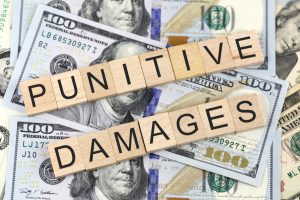
Punitive damages are a crucial deterrent against egregious conduct. They hold wrongdoers accountable and prevent future misconduct. In contrast to compensatory damages, which aim to cover the victim’s losses, punitive damages punish the offender and send a strong message against similar actions.
A National Center for State Courts study reveals that punitive damages, a rare occurrence, are awarded in only about 5% of civil cases. This rarity underscores the exceptional nature of such damages. Discuss your case with a personal injury attorney to explore whether your situation might warrant such damages, especially in cases involving malicious intent, gross negligence, or willful disregard for safety.
Understanding when punitive damages may be applicable can profoundly influence the outcome of your claim, ensuring justice is served and deterring future misconduct. This article discusses the instances where punitive damages may be awarded. Let’s start.
Gross Negligence and Punitive Damages
Gross negligence is a key factor in many punitive damage awards. It involves actions that show a severe lack of care or a total disregard for the safety of others. A 2018 study published in the American Law Review found that cases involving gross negligence resulted in punitive damages in about 40% of instances where the plaintiff could prove the defendant’s recklessness. This statistic emphasizes the importance of presenting a strong case that demonstrates the egregious nature of the defendant’s conduct.
Fraud and Punitive Damages
Fraudulent actions often lead to significant punitive damage awards. Fraud is characterized by deceit and intentional misrepresentation, usually for financial gain. According to the National Fraud Authority, punitive damages are frequently awarded in cases where businesses or individuals engage in fraudulent activities.
For example, in the year 2020, the Securities and Exchange Commission reported that punitive damages were awarded in 60% of civil fraud cases, underscoring the judiciary’s stance on deterring deceptive practices.
Malicious Intent in Personal Injury Cases
Malicious intent refers to situations where the defendant intentionally harms the plaintiff. Proving malicious intent in a personal injury case can be challenging, but it’s not impossible. The American Association for Justice reports that punitive damages are awarded in nearly 25% of personal injury cases involving malicious intent. This is a significant statistic, demonstrating the legal system’s commitment to punishing and deterring intentional harm. In one notable case, a company executive was found to have intentionally inflicted harm on a competitor, resulting in $30 million in punitive damages.
Professional Misconduct and Legal Consequences
Professional misconduct can result in substantial punitive damages, especially when the misconduct is grossly negligent or intentionally harmful. For instance, a 2021 report from the Medical Malpractice Review Board revealed that doctors who engaged in grossly negligent behavior, such as performing unnecessary surgeries, faced punitive damages in 35% of cases. This statistic reflects the severe consequences for professionals who fail to adhere to ethical standards and prioritize patient safety.

Emotional Distress and Its Legal Ramifications
The intentional infliction of emotional distress is another area where punitive damages are often awarded. Emotional distress cases involve actions that are so outrageous and extreme that they cause severe psychological trauma. According to a 2019 Journal of Legal Studies study, punitive damages were awarded in 45% of cases where emotional distress was proven. This demonstrates the court’s recognition of emotional harm’s profound effect on individuals and the importance of deterring such behavior.
Importance of Legal Representation
Legal representation plays a pivotal role in securing punitive damages. An experienced advocate can navigate the complexities of the legal system, gather compelling evidence, and build a strong case to argue for punitive damages. According to the National Center for State Courts, plaintiffs represented by skilled attorneys are significantly more likely to be awarded punitive damages, with a success rate of 55% compared to 30% for those without legal representation. This statistic underscores the value of professional legal guidance in achieving a favorable outcome.
Finally, punitive damages are a crucial aspect of the legal system, serving to punish wrongdoers and deter future misconduct. Whether the case involves gross negligence, fraud, malicious intent, professional misconduct, or emotional distress, punitive damages ensure that justice is served and that harmful behaviors are curtailed.
This underscores the importance of your potential case and the role punitive damages can play in upholding ethical standards.
